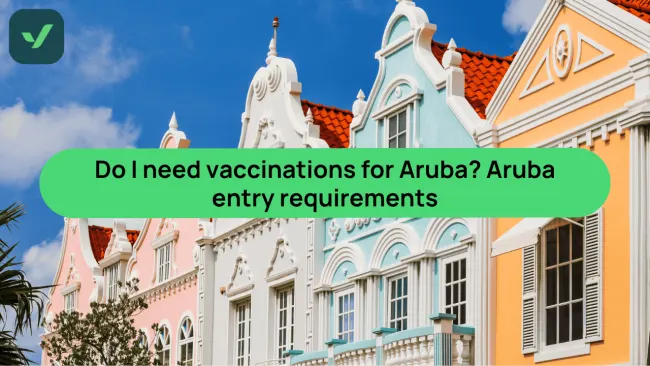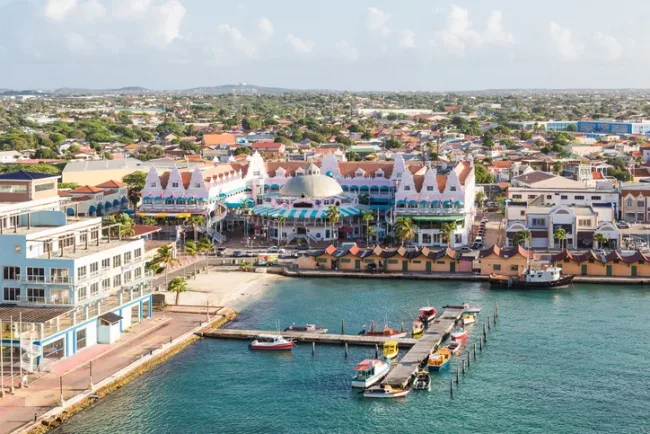
Aruba
Welcome to Aruba
Wondering if you need a visa for Aruba? You've come to the right place. This blog will help you determine whether a visa is necessary for your trip to Aruba and, if so, which type matches your travel plans. We're here to simplify the visa application process so you can focus more on planning your journey.

What’s a Caribbean Short-Stay Visa for Aruba, and who’s it for?
Who’s the Caribbean Short-Stay Visa for Aruba for?
This visa is valid for Aruba and the other Caribbean parts of the Kingdom of the Netherlands (Bonaire, Curaçao, Saba, St. Eustatius, and St. Maarten).
More than 100 countries, including South Africa, Cambodia, Iran, Thailand, Saudi Arabia, and more, need to apply for a Caribbean Short-Stay Visa for Aruba before entering the country.
Who’s not eligible for a Caribbean Short-Stay Visa for Aruba?
-
More than 80 countries are visa-exempt, including the United States, New Zealand, European Union countries, Schengen member states, and more.
-
Holders of a valid residence permit (temporary or permanent) from another part of the Kingdom of the Netherlands, the United States of America, Canada, The Schengen Territory, United Kingdom or Ireland.
-
Diplomatic passport holders from Bolivia, Chad, Indonesia, Jamaica, Malawi, Morocco, Pakistan, Peru, Russia, Senegal, Serbia, Thailand, Ukraine, Tunisia and Turkey.
-
Service passport holders from Bolivia, Indonesia, Jamaica, Malawi, Morocco, Peru, Thailand, Tunisia and Turkey.
-
Holders of laissez-passer documents issued by the World Bank, International Monetary Fund, the United Nations, or any of its agencies.
-
Crew members of vessels or aircraft mooring or landing on the island for commercial purposes.
-
Children younger than 12 who are traveling with a parent or guardian.
-
Travellers continuing (in transit) to a third country within 24 hours or the same day by aircraft and holding tickets with reserved seats and all documents required for their onward journey.
What’s the purpose of the Caribbean Short-Stay Visa for Aruba?
The following activities can be carried out with this visa:
-
Tourism
-
Sports
-
Medical reasons
-
Family visits
-
Study
-
Religious purposes
How long can you stay with a Caribbean Short-Stay Visa for Aruba?
This visa can be issued for single or multiple entries. The duration of stay allowed varies by nationality. However, the maximum time allowed is 180 consecutive days within 365 days.
What’s an Aruba ED Card, and who’s it for?
Who’s the Aruba ED Card for?
The Aruba Embarkation-Disembarkation (ED) Card must be completed by all visitors to Aruba, including those who don’t need a visa to enter the island.
What’s the purpose of the Aruba ED Card?
The online ED card replaces the original paper-based version. It is used by Aruban immigration authorities to collect information about incoming passengers before they enter the Caribbean island.
How long can you stay with an Aruba ED Card?
The Aruba ED Card can only be used once. This means you must fill out a new one every time you enter or leave the island.
Learn more about the Aruba ED Card.
What’s an Aruba Business Visa, and who’s it for?
Who’s the Aruba Business Visa for?
Individuals who intend to engage in business activities in Aruba without directly entering the local labor market. This includes business meetings, conferences, or establishing business contacts.
What’s the purpose of the Aruba Business Visa?
To facilitate business-related visits, allowing business travelers to explore business opportunities, attend meetings, or participate in conferences or training sessions in Aruba.
How long can you stay with an Aruba Business Visa?
Visitors can stay in Aruba for up to 90 days within 180 days without a visa if they are visa-exempt. For those who require a visa, the stay duration aligns with the purpose of the business visit. Still, it should be within the 90-day limit within 180 days.
What’s an Aruba Digital Nomad Visa, and who’s it for?
Who’s the Aruba Digital Nomad Visa for?
The One Happy Workation program, Aruba's version of a digital nomad visa, is designed for remote workers from the United States, Canada, the United Kingdom, Ireland, and the Schengen member states who want to work remotely from Aruba.
What’s the purpose of the Aruba Digital Nomad Visa?
This program allows digital nomads to live and work in Aruba, allowing them to enjoy a working holiday in a beautiful setting. Participants must refrain from engaging in business with local entities or working for Aruban employers during their stay.
How long can you stay with an Aruba Digital Nomad Visa?
Participants can stay in Aruba for up to 3 months under the One Happy Workation program. This visa cannot be extended.
What are the Aruban long-term visa options, and who are they for?

Aruba has long-term visa options catering to different needs, including business activities, educational pursuits, employment opportunities, etc. Here's a brief look at the more popular options.
-
Caribbean Carpet Programme: This program is designed for individuals who frequently travel to Aruba or other Dutch Caribbean islands for business or investment purposes. The visa obtained through this program is valid for 1 to 4 years and has a simplified application process.
-
Residence Permit: A residence permit is required for those looking to stay in Aruba for more than 90 days. This permit is necessary for various purposes, including living with family members or studying in Aruba.
-
Work Permit: If you plan to undertake paid work in Aruba, you'll need a work permit and any visa requirements. The work permit ensures that you are legally allowed to work in Aruba and is usually tied to the employer or specific job offer in the country.
It's important to note that we don’t handle these long-term visa applications. For detailed information on each visa type, application procedures, and the most up-to-date requirements, visit the Departamento di Integracion, Maneho y Admision di Stranhero (DIMAS) website.
Staying healthy in Aruba: Here’s what you need to know
Ensuring you're in good health before your trip to Aruba is key to an enjoyable visit. Here's a general health guide that will benefit visitors to the country.
Make sure to stay updated on routine vaccines
It's essential to be current with your routine vaccines before traveling. This includes vaccinations for measles-mumps-rubella (MMR), diphtheria-tetanus-pertussis (DPT), varicella (chickenpox), polio, and your yearly flu shot.
The following vaccines are recommended for international visitors:
-
Hepatitis A: This is advisable for anyone over a year old who hasn't received this vaccine and is traveling to Aruba.
-
Hepatitis B: Recommended for unvaccinated travelers of all ages planning to visit Aruba.
-
Measles: MMR vaccine doses are recommended for infants aged 6 to 11 months before traveling.
-
Rabies: This vaccine is recommended for travelers involved in outdoor activities that might expose them to animal bites or those working with animals.
-
Typhoid: Especially recommended for visitors to rural areas, smaller towns, or those staying with locals.
-
Yellow fever: Required for travelers older than nine months old and coming from countries with a risk of yellow fever virus transmission.
-
Stay informed about the latest COVID-19 travel advisories for Aruba, including any quarantine, testing, or vaccine documentation requirements. For up-to-date information, consult your airline or contact the nearest Aruban or Dutch embassy or consulate.
Medical facilities
-
Aruba offers public and private medical facilities, with the quality of care generally considered good throughout the island.
-
In the countryside, healthcare facilities may be more basic, and emergency services may be limited.
-
Many international visitors often prefer private healthcare because of the broader selection of services and access to specialists.
-
You'll find pharmacies in cities and urban areas, stocking various over-the-counter drugs. However, if you need a particular prescription medication, it's better to bring it with you.
Health insurance
It’s essential to have travel health insurance for your entire trip.
Healthcare, especially in private facilities, can get expensive. Ensure your insurance covers significant health costs, including if you need to be evacuated for medical care.
Double-check with your insurance provider to confirm your policy covers:
-
Refunds for any travel mishaps, like cancellations or delays.
-
Costs for medical treatments and possible medical evacuation.
-
Compensation for lost baggage.
Things to be aware of when visiting Aruba

Aruba is a top tropical destination. To make your trip as smooth as possible, here are some guidelines to keep in mind.
-
Food and water safety: To minimize the chances of health issues, drink only bottled water and be cautious with raw or undercooked meals.
-
Hurricane season: The hurricane season in the Caribbean typically runs from June to November, and most pass to the north of Aruba. Check the World Meteorological Organization website for the latest weather updates.
-
Safety in water activities: Coastal waters can be dangerous. If you are planning to participate in water sports such as scuba diving, jetskiing, or parasailing, follow the instructions and warnings of local authorities.
-
Wildlife safety: Always maintain a safe distance when observing wildlife and only use reputable and professional guides or tour operators.
Medication for personal use
For those taking medication to Aruba, here’s what you need to know:
-
Declare all medications: Make sure to declare any medications at customs, mainly if they are prescription or controlled substances.
-
Original packaging is a must: Always keep medications in their original packaging, clearly labeled with your name and the prescription information.
-
Carry a prescription or doctor's note: Bring a note from your doctor or a recent prescription detailing why you need the medication.
-
Check for restrictions: Double-check with the nearest Aruban or Dutch embassy or consulate to ensure no bans or restrictions on your medications.
-
Bring only what you need: To avoid any issues, only take the medication necessary for your trip.
Related Articles


 Australia ETA Online
Australia ETA Online
 United Kingdom ETA
United Kingdom ETA
 India Tourist eVisa
India Tourist eVisa
 Canada ETA Visa
Canada ETA Visa
 Turkey eVisa
Turkey eVisa
 Egypt eVisa
Egypt eVisa
 Singapore SG Arrival Card
Singapore SG Arrival Card
 Indonesia eVoa Visa
Indonesia eVoa Visa
 Aruba ED Card
Aruba ED Card
